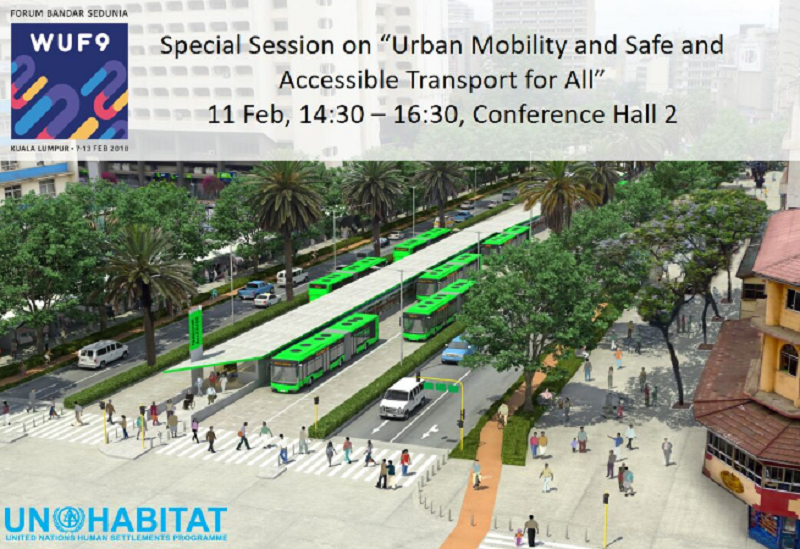
ECF & WCA were present at the World Urban Forum 9, held in Kuala Lumpur, 7-13 February 2018
The World Urban Forum (WUF) is an event organized every two years by the UN-Habitat since 2002; this year’s edition was held in Kuala Lumpur (Malaysia) from 7 to 13 February 2018. The main focus of the WUF9 has been the implementation of the New Urban Agenda (NUA), which was adopted in 2016 in Quito (Ecuador), and the planning of sustainable cities in close connection with the objectives set by Agenda 2030 and the Sustainable Development Goals. ECF and WCA were present at the forum.
The Special Session on Urban Mobility and Safe and Accessible Transport was an opportunity for ECF/WCA to address a wide range of stakeholders from global institutions, civil society and private sector on the importance of cycling for implementing the NUA. Marcio Deslandes (Global Policies Director at the European Cyclists’ Federation) participated in the panel, which provided the possibility to debate the key role of cycling in the implementation of the NUA with, among others, Daniel Guenther (German Federal Ministry for Economic Cooperation and Development), Francois Bausch (Minister of Sustainable Development and Infrastructure of Luxembourg), but also Shreya Gadepalli (Institute for Transportation and Development Policy in India), Philip Turner (Sustainable Development Manager at International Organization for Public Transport).
The Session aimed at exploring how it is possible to cope with a growing and unstoppable urbanization process and the transformation of Urban Mobility Systems. An increasing urban population means more traffic and higher pollution levels, therefore promoting smart, integrated and innovative mobility is a priority to ensure sustainable cities for all. The panel allowed the audience to discover more about projects conducted worldwide at national, regional and local levels in order to depart from a car-oriented model to low carbon and active mobility plans. In this regard, it is important to highlight that the debate was also used as an occasion to focus the attention on the Urban Pathways Project and the launch of the Sustainable Urban Mobility Pathways platform.
The project and the associated platform intend to promote, finance and share experiences on the implementation of low carbon plans for urban mobility, energy and waste management. Mr. Deslandes pointed out the importance of cycling as a great tool to implement the objectives of NUA and plan the cities we want. When talking about human sized cities, we are putting people at the center of discussions. Bicycles bring “the idea of accessibility for all by promoting social inclusion, empowering low income communities, children and women”. It is particularly “in big cities that the full potential of cycling and walking gets unleashed”. In fact, the integration of cycling with other modes of transport can drastically reduce commuting costs. This is especially important in the global south where “a person can go higher than 40% of his/her earnings because they are dependent on different and expensive modes just to reach the hubs of mass transportation”. Cycling means also access to education. A bicycle can drastically reduce a kid’s journey time between his/her house and the school, bringing undeniable benefits to all kids who live in the developing world. Health is another fundamental aspect strongly linked to cycling. Mr. Deslandes specified how cycling helps us to stay active and healthy, but also contributes to improve public health by reducing carbon emissions – effectively creating more pleasant cities.
Moreover, he drew the attention on the SGD 17 and demanded more partnerships and collaborations concerning mobility: walking, cycling and public transport policies need to be prioritized at all levels.
The following question that inevitably springs to mind is what can be the trigger to shift towards more sustainable mobility?
Mr. Deslandes recalled that sustainable mobility is a novelty for many decision makers around the world and that:
“cars and paved roads are still perceived as an indicator of success and development by most of the population”.
Therefore, education and capacity building are the most powerful weapons to boost the change towards sustainable mobility. We need more policies, regulations and legislations on the topic and it is necessary to work with enforcement agencies to ensure that measures are put into practice. Along with this, it is essential to encourage partnerships and collaborations among different actors: governments, civil societies, development funds and the private sector.
From a practical point of view, walking, cycling and public transport need to become more ‘appealing’, this translates into make them more efficient, comfortable and affordable than cars.
The final message of Mr. Deslandes has been that union is strength. A revolution is based on participation, therefore it is vital to expand the discussion and include all possible stakeholders because sustainable mobility is an issue affecting all of us.
Network/Project Involved:
Contact the author
Recent news!
Upcoming events
Contact Us
Avenue des Arts, 7-8
Postal address: Rue de la Charité, 22
1210 Brussels, Belgium









